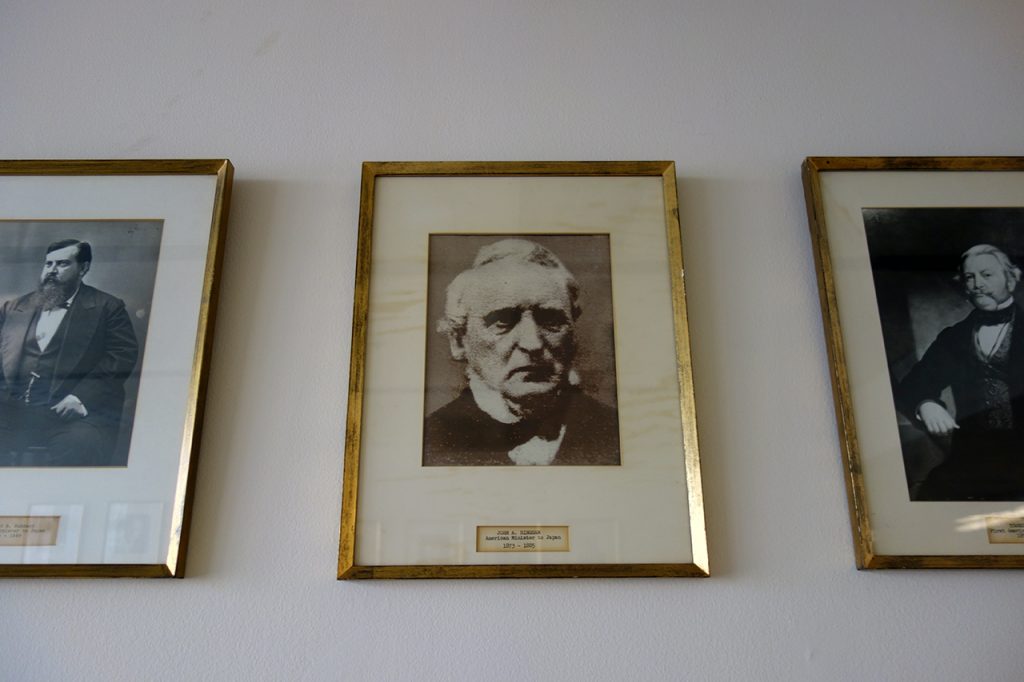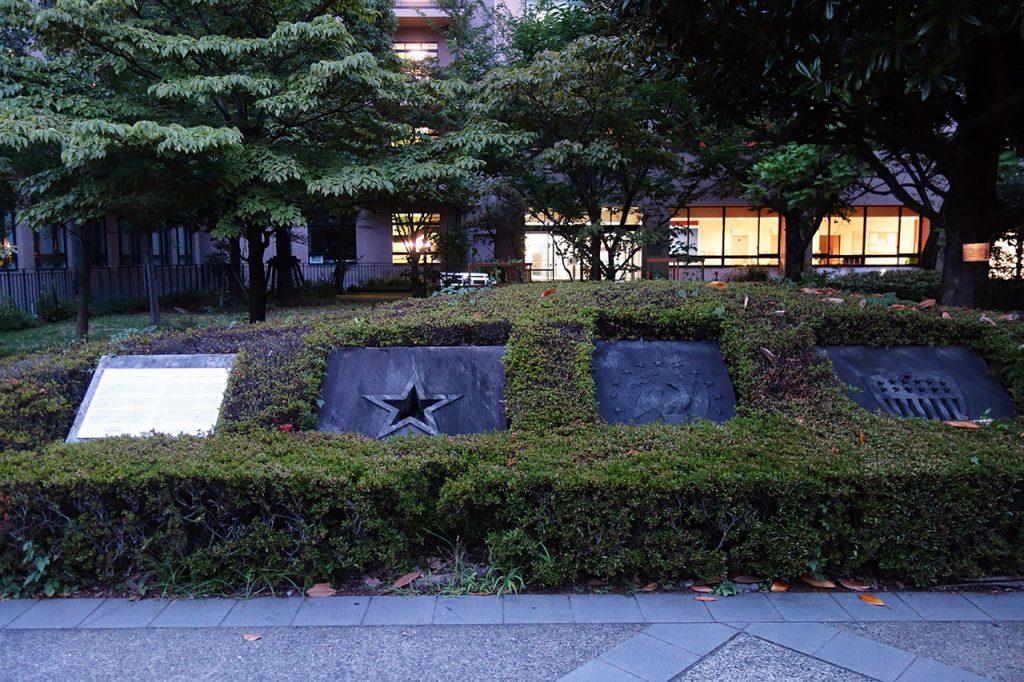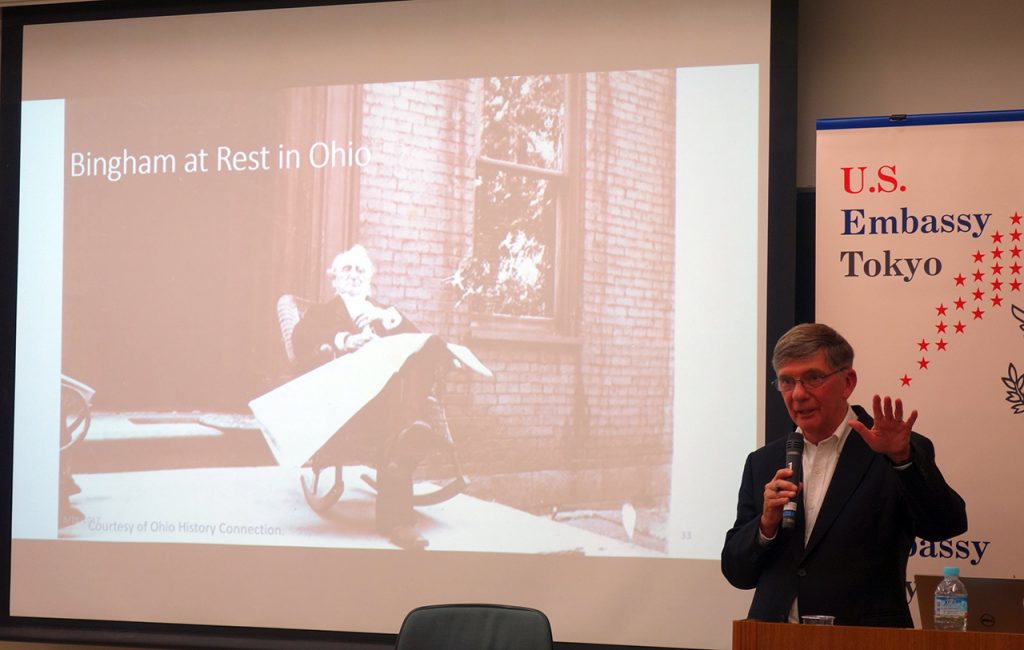Have you ever heard of John Bingham? Not very many people have, it seems. Until recently I didn’t know who he was either. John Bingham was an American politician who made a valuable contribution to U.S.-Japan ties in the early Meiji Era (late 19th century) as the American minister to Japan, a title that was a precursor to the current position of ambassador. Former U.S. diplomat Sam Kidder, who has been researching Bingham, recently gave a talk about him at Tokyo Woman’s Christian University. I attended the lecture and had an opportunity to interview Mr. Kidder at the U.S. Embassy the following day. This article draws on Mr. Kidder’s talk and examines Bingham’s accomplishments during the 12 years he spent in Japan.

John Bingham's photo is displayed at the U.S. Embassy alongside those of other former ministers and ambassadors to Japan.
John Armor Bingham (1815–1900) grew up in two small American towns, one in Pennsylvania and the other in Ohio. He was elected to the House of Representatives in 1854 and later served as an advisor to Abraham Lincoln, the 16th President of the United States. Bingham’s greatest accomplishment was his work on the framing of the Fourteenth Amendment to the Constitution. Adopted after the Civil War, this amendment defined the scope of citizenship and continues to be an important basis for the protection of human rights to this day.
In September 1873, Bingham arrived in Japan to take up the post of U.S. minister to Japan, a position appointed to him by President Ulysses Grant. He held this post for about 12 years until July 1885, making him America’s longest-serving minister or ambassador to Japan.
Relocating the U.S. legation and creating a foundation for bilateral relations
The U.S. embassy was known as the “U.S. legation” in the late 19th century when Bingham took up his new position in Japan. The term “ambassador” wasn’t used as the official title for the head of the U.S. legation in Tokyo until the beginning of the 20th century. Legations, or embassies, perform key roles as contact points for diplomatic activities with the host government. The following are the six main activities conducted by the legation in the days of Bingham. The embassy continues to perform many of these functions today.
- Build ties with the Japanese government
- Report to Washington on the political situation in Tokyo
- Convince the Japanese government to take actions that benefit the U.S.
- Develop and maintain relationships with other countries’ embassies and legations in Japan
- Look after and oversee U.S. citizens in Japan
- Manage its own operations
When Bingham arrived in Japan, the functions of the U.S. legation were limited. His predecessor lived in a hotel in Yokohama and rarely traveled up to Tokyo to meet with Japanese government officials. The legation did not have enough employees either. Bingham put the legation’s operations in order by relocating it to the Tsukiji district of Tokyo and increasing its staff by hiring people locally.

A set of stone tablets at St. Luke's International Hospital marks the former site of the United States legation in Japan.
Revision of “unequal treaties”
Following 200 years of seclusion from the outside world, Japan opened its doors to regular trade and discourse with other countries about 15 years prior to Bingham’s arrival. Though Japan had concluded treaties with other countries, those were generally humiliating, unfair, and disadvantageous to Japan. Two negative elements in these treaties were extraterritoriality and lack of tariff autonomy. Extraterritoriality meant that the Japanese government did not have jurisdiction over crimes committed by foreigners in the foreign settlements. Moreover, Japan could not set tariffs itself because it did not have tariff autonomy. This created major financial problems for the government.
Bingham worked to have these “unequal treaties” revised. Why did he do this? First, he was influenced by an American missionary group that backed the revision of the unequal treaties. Second, he was concerned that the Japanese government would be weakened if it continued to lack tariff autonomy and that the nation would then start to be eyed by Britain and other European countries looking to expand their influence in Asia. The U.S. government did not want Japan to be controlled by European powers.
Although the revision of the unequal treaties was not completed during Bingham’s tenure, the foundation he built for the U.S. legation and his efforts to have the treaties revised formed an important foundation for the strong U.S.-Japan ties we enjoy today. Establishing the legation as the central point of contact between the U.S. and Japan enhanced bilateral ties and laid the groundwork for the revision of the unequal treaties in later years. The fact that President Grant dispatched a U.S. political heavyweight to Japan as his nation’s minister also showed that the U.S. valued its ties with Japan.

Mr. Sam Kidder presents a lecture on John Bingham at Tokyo Woman's Christian University.
When I met with Mr. Kidder on the day after his lecture on Bingham, I was curious to find out how he had first become interested in Bingham. Mr. Kidder told me he was intrigued by Bingham because he was a politically significant figure in his day and his birthplace was close to where Kidder lives today. I also asked Kidder how Bingham has influenced him. “When we look at history, I think we naturally always look at the most interesting things, which tend to be the battles and the major tragedies,” he replied. He explained that there are people in history who hardly anyone has heard of even though they worked hard and accomplished great things.
“Bingham is interesting to me because he was trying to accomplish something because of his values, not because of some kind of social gratification,” said Kidder. “To me, he is a very interesting person, and I’m sure that there are a lot of people like that.” By researching Bingham, Kidder apparently came to realize the importance of looking at history from different angles.
Drawing on his experience as a diplomat in Asia for more than 25 years, Kidder offered young people in Japan the following advice: “Do everything you can. Read everything you can. Look at everything you can. Go everywhere you can. Study wherever you can. Japan is a wonderful place, but Japanese need to sometimes get out of their wonderful place. Some of the Meiji leaders really understood that.”
Although I had never heard of John Bingham before, I now realize that his achievements were instrumental in building a strong foundation for friendly ties between the U.S. and Japan. As Kidder says, if you look at history from various angles, you will discover different things. Speaking to him made me realize how important it is for us to do that.
Mr. Kidder worked as a diplomat for the U.S. Foreign Commercial Service for more than 25 years, serving mainly in Japan, South Korea, and India. After serving as Minister-Counselor for Commercial Affairs at the U.S. Embassy in Tokyo, he was executive director at the American Chamber of Commerce in Japan (ACCJ) for eight years. He returned to the United States in 2015. He currently works as the managing director of a boutique brand management company that has a vendor relationship with one of Japan’s leading advertising companies.







COMMENTS0
LEAVE A COMMENT
TOP